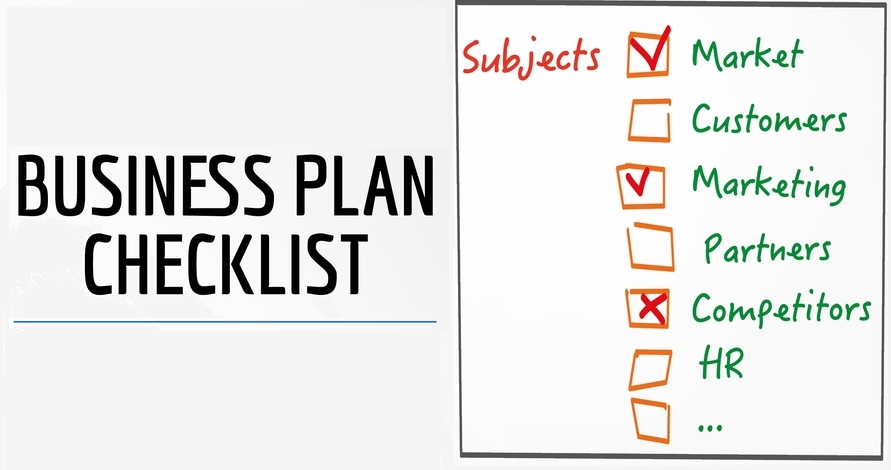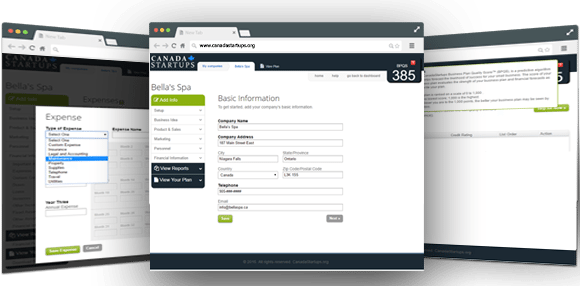Creating the Perfect Startup Business Plan
Category: Business Planning
Tags: business plan, business plan for canada, business startup plan
When deciding to get into a business, creating a business plan is one of those things that you have to think about. The perfect startup business plan is not very easy to create but if you take the time and put in some effort into it, you can have a well developed business plan on your hands that you can use to successfully startup and run your business.
Having to write a business plan can be very scary.
What do you write? How much do you write? What if you don’t know what to put in certain sections? How about the numbers/financials? What if…
You are planning a startup business. Nobody said it will be easy. Nobody said you will have all of the answers.
BUT nobody said that you can just sit down and write the perfect startup business plan in a matter of hours. It just doesn’t work.
A business plan takes time, takes careful planning, it requires some research to be done – sort of like a preparation to get you ready for the business (since it’s a lot of work too).
One thing that is very important to know is that you should not rush the business plan. Instead take the time (not too much) but take the time needed to carefully prepare the plan. After all, this is going to be your guide for the business you intend on starting up.
Before you move on to the next step and get started, it’s important to know why you need a business plan. Why do you think you need one? Before moving on to the next step, answer that question to yourself.
Why you need a business plan for your startup
A business plan is a critical document that you as a startup busines should have ready before you jump into the startup.
Why?
Well, a business plan is sort of a guide to how your business will start, how it will operate and it’s almost like a skeleton that holds a body together. Each of the components necessary to be included within the business plan, contain a critical piece of information that will ensure your success.
The reason why many people starting a small business decided that they want to create a business plan is because it will actually be a test run of the business on paper.
It’s important to know all of the aspects of the business before you actually jump in and do “business”.
Do you know what your mission is? What is the ultimate goal? Who are your customers? What will you provide? How will you do it? How much will it cost? How much will you make? What about all those unknowns?
These are the type of things your business plan will prepare you.
Sure you may already know the answers, but when creating the startup business plan you will see the unexpected and be able to plan for them. Putting something down on paper is much better then just having it in your head. At least you can refer to your business plan when starting up and say “oh ya, that’s what I wanted to do”.
A business plan is also critical if you are seeing any funding assistance be it government or private if you want to take your small business startup to the next level.
Don’t Waste Time on a Startup Business Plan
Perhaps you’ve heard that along the way to starting your own business.
While a business plan is “necessary” to a point, a lot of business owners chose to not create a business plan for their startup.
As somebody who deals with thousands of start ups and existing business owners each month, while having a business plan isn’t required per-se, it is something that every single business should have in order to plan for it all.
ups and existing business owners each month, while having a business plan isn’t required per-se, it is something that every single business should have in order to plan for it all.
Some businesses are just a gold mine – a investor may see it and say YES without thinking twice. If this was the case, you probably wouldn’t be reading an article on creating the perfect business plan for your startup.
Just like anything in business, everybody has something to say about it. Everyone seems to be an expert.
This is hard. Who can you trust and who can you listen to?
Well, it’s important to listen to both angles and that’s exactly what we want you to do.
If you believe your idea has some insane potential, perhaps a business plan for your startup could be a waste of time. Who wants to write 40 to 50 pages when you can do a few smaller things and get the same result? Right?A business plan is time consuming. It gets out-dated fairly quickly if you don’t constantly update it and who the heck has time to read all that?
So one option, if you don’t want to waste your precious time writing the perfect business plan for your startup is to do these 4 things instead:
# 1 Create a Pitch Deck Presentation
What is a Pitch Deck Presentation you ask? Well it’s like an old school power point presentation that explains your company, your mission, your goals and what it is you need help with. Basically a Pitch Deck is like an elevator pitch (Pitch your idea to an investor in 60 seconds).
The good thing about Pitch Deck presentations is that you can put a lot of information in a presentation that is 10 to 15 slides – and they are visually appealing and a lot of times keep the investor or funding agency interested (much more then if they were just reading your 50 page business plan), maybe.
Keep in mind that a Pitch Deck presentation is a great way to present your business to potential investors, but it’s not always the only thing that works. A lot of business owners prepare both a well put together business plan as well as a presentation. This way you can’t go wrong.
If you decide that a PitchDeck is something you want to create, consider using our Pitch Deck Builder Tool. A great, simple to use and very friendly tool to get it done.
When creating a pitch deck presentation for your startup business, be sure to include the critical components that make a Pitch Deck the one that a business investor wants to see:
- Company Overview (provide a quick overview or summary of your company)
- Mission of the Company (explain your vision)
- The Team (provide an explanation of your staff, the key people!)
- The Problem (what is the problem you are trying to solve?)
- The Solution (what is your proposed solution? why is it better than other solutions or products?)
- The Market Opportunity (how large is the market?)
- The Product (give specifics on the product or service)
- The Customers (who are the target customers?)
- The Competition (who are the key competitors?)
- Business Model (explain the business model?)
- The Marketing Plan (how do you plan to market your business?)
- Financials (actual and projected profit & loss and cash flow)
- The Funding Needs (how much capital you are trying to raise?)
Don’t overpower the presentation with a large amount of text. Summarize your points and ensure you have talking points where you can go in more detail shall you need to.
# 2 Develop a Clear and Visible Product Or Service
If you are trying to avoid a business plan, sure you can do it but when talking to potential investors or funding agencies it’s important to be able to show what it is you are offering. If it’s a product, perhaps it’s worth having a prototype made, or a demo model that you can show. If a service, perhaps a video or some sort of demonstration how the service works, how it will benefit the customer and maybe even a number of client/customer testimonial using or benefiting from the service.
Visual works well.
# 3 In-Depth Analysis Of Market and Competition
What do potential investors and government funding agencies look for? They look to see if you understand the market, if you know what to do, if you will be successful.
There are a lot of business startups that go into it without a startup business plan that just end up making a mess, spend a ton of money and fail.
Are you one of those?
Are you a business startup that believes there is no competition?
Remember, no matter what type of industry you are in, what type of business you have there is always competition.
Competition does not have to be direct competition (somebody who has the exact same product or service), there can be a lot of in-direct competition which is anybody who is in the same target area or has the same targeted customer.
For example: A watch maker, their direct competitor would include another watch maker. However, when you look at the in-direct competition you can say that any jewelry or personal accessories company is a competitor, and more. A watch is a wearable accessories; so is a bracelet, so is a necklace..etc
Being able to document and provide an in-depth analysis of your competition and the market you are in will ensure that you get the respect you and your startup business deserve when starting to seek funding.
# 4 Having Details Financials
Don’t think you’re getting off that easy. Every single funding agency or private investors wants to see that you have what it takes to be successful,.
What better way to see then by looking at the financials you provide.
This includes things like the balance sheet, income statements, profit/loss statements, cash flow statements…etc
Don’t have them?
Your business isn’t started yet?
Well, part of creating financials is projections and planning ahead. This is another reason why a business plan is key to the success of a business.
A lot of times startup companies will estate potential costs, expenses and try to project their sales numbers based on research and data collected.
Do the same!
Without appropriate financials, your chances of getting any funding help is non existing.
——
Your Options When Writing the Perfect Startup Business Plan
Options, options, options.
Sometimes they are great, or they can be a nightmare especially if you are an indecisive type of entrepreneurs.
You already know that you need a business plan. So there, the decision has been made for you. But what is the next step to get a business plan done?
As a new small business you probably want to ensure that you have the perfect startup business plan, so you have a few options (depending on a few factors):
- Write your own business plan from scratch
- Hire a professional to write your business plan
- Use a business plan software
- Use an existing business plan template
Each one of the above options has it’s pro’s and con’s. The ultimate decision to write a business plan for your startup and the approach you take depends on you. So let’s break it down quickly.
Write your own business plan from scratch
Before you decide that you’re now a business plan writer, ask yourself the questions: Am I capable of doing this? Do I have the writing skills? Do I know what to put in here? Will this take me forever? Will writing my own business plan hurt my chances?
While there are plenty of people who have written business plan on their own from scratch, it’s not for everyone.
Writing your own startup business plan takes times, research and definitely knowledge of business plans, not to mention knowing all of the key details needed to be put into the plan that matches your business and your industry.
The pros of writing your own business plan from scratch include not having to spend a ton of money to get a business plan written; not having to explain to somebody your business idea; you can do as much as you’d like or as little as you’d like when you can. However the con’s include; not knowing how to make a proper business plan and simply messing it up, running your chances of getting funded by not including all you need to include and it takes a long time to properly develop your plan – probably time you should be spending on building your business.
Hiring professionals to write your business plan
While you can “try” and write your own business plan, maybe it’s one of those things that’s better left to the professionals to ensure that you have a well developed and professional business plan on your hands.
The last thing you want, when applying for funding for your startup business is to be told, “sorry your business plan is bad”, and that’s the reason for being denied financing.
Business plan professionals exist for this purpose exactly, they know what to do, they will do it right and you will be happy.
Those are the pros. The cons however are simply money. As a startup business, every dollar counts. Do you have $1,500 to $5,000 to develop a business plan via a professional writer? Is it worth it? Could that money be used for something different in your business startup?
These are things things to consider when thinking of hiring a professional to write your business plan.
Using a business plan software or tool
There are many business plan builder tools out there. Some are good, some not so good.
The Business Plan Builder Tool by CanadaStartups.org has actually been rated as one of the most user friendly business plan builder tools, so if you’re looking to get a well developed business plan done, and you don’t want the head ache of it all, that’s the tool for you. Not only that, but it also includes an expert review service where a business plan professional takes your business plan and checks it, reviews it and provides you with actionable feedback to improve.
The pros of using a business plan software or tool are simple: they are cheaper then having somebody write it for you; most of the time you are guided step by step and you get the plan done faster. The cons are still that you have to do the work yourself. But if you’re guided step by step, especially if you are given a professional who reviews your plan afterwards, this may be the best option for you if you’re looking to save a few thousand dollars when creating your own perfect startup business plan.
Using existing business plan templates
Templates are always fun. Somebody created them to help people like you develop a business plan.
Templates exist for many different business plan options, start a coffee shop business plan, start a bakery business plan, start a retail shop, start an online business, start a medical business..etc; the list goes on.
They are easy to use, always fill in the blanks and pre-determined to give you what a business plan includes.
A lot of business plan templates are free which is one of the top reasons why so many people chose them. But the cons sometimes out-weight the pros. Using a business plan template, especially a free one is often noticeable. If you’re a first time business owner, it’s a good way to start and get a rough draft, but its something you should definitely improve on.
When providing a “templates business plan” to a potential investor or funding agency, they will see it and more often then not realize its a template and may very well ignore it.
That being said, a free business plan template to help you get started and to develop a rough draft could be a great way to go.
Whatever the option you go with to get your business plan written, it’s important to not delay. If you have a business plan idea, get it on paper and get started.

What is your perfect startup business plan?
When deciding to get into business for yourself, a lot of careful planning needs to happen before you can officially launch your startup.
That’s why we create business plans.
Before you start writing your business plan you have to ask yourself, what is your perfect business plan? What does it do for you? What does it answer?
If somebody was to read your completed business plan, what is the outcome you want them to have?
Some people write business plans so that they can have a guide for the business, sort of like a blueprint. Others will write a business to share with their employees, so that everyone is on the same page in terms of the mission, the strategy and goals. Some will create a business plan in hopes to attract potential business partners who share the same interests while others will write a business plan in order to get their startup funded; be it via government funding programs, private investors, family and friends, the banks..etc
So what does the perfect startup business plan answer?
- Who are you?
- What do you want to do?
- Why do you want to do it?
- How will you do it?
- What will it take for you to do it?
- How will it work?
- How much will you charge?
- What will it all cost?
- What does the future hold?
- What do you need?
These are some of the questions your business plan should answer weather you are just starting up, looking for partners, sharing with your employees or looking for funding.
If you are writing a business plan in hopes to obtain funding for your startup, there are a few different ways to approach it and to write your business plan. It’s important to know what you need funding for before you actually ask for the funds.
Your Startup Funding Needs
Starting a business, no matter who you are, you will have funding needs. Some are more lucky then others and have enough capital to start up, but in many cases, startup entrepreneurs need initial capital to make it all happen.
This is often the reason to create a business plan in the first place – in order to apply for financing or funding.
So what do you need funding for?
It’s a very important question. In fact, one of the most important questions in your business plan if your intentions are to obtain funding.
If you just answered, “I need funding to startup”, this is the section of this long article that you should be reading the most!
Yes, everyone needs funding to “startup”, but what about the “startup process” do you need to have funding for?
When writing a business plan in order to obtain funding for your business you have to be able to break down your funding needs.
If you are applying for government funding for example, there are hundreds of different government funding programs you can apply to. Some programs fund certain locations, certain industries and some fund only certain funding needs.
So when you are starting up and you need money to startup, break it down to what you actually need.
Do you need money to pay research and development, importing/exporting goods, to help you hire and train staff, to help you pay for tools, inventory, equipment and supplies, maybe to cover some marketing costs, to help you renovate, or maybe you need money to improve your cash flow?
These are all things that fit into “starting up costs”, but when you are developing your business plan to show your funding needs, don’t just summarize what you need – break it down.
For example:
Let’s just say you are starting a hair salon and in order to successfully be able to launch you need $100,000 in funding.
If you write a business plan and you state that you need $100,000 in funding to start up, you won’t get very far. Instead, you need to break down your funding needs and provide approximate values for what you need the funding for.
- $10,000 for 3 months of salaries for an employee
- $20,000 for startup marketing/advertising costs
- $3,000 for rent
- $7,000 for bills (water, electricity, phone, internet..etc)
- $35,000 to purchase tools and equipment
- $25,000 to make leasehold improvements
There you go, that’s a much better explanation of what you need $100,000 in funding for then just stating “I need $100,000 to startup”.
By breaking it down, you are showing to the investors, the banks or the govenrment funding agency what’s really needed. This way, you will be able to apply to various programs that perhaps can fund multiple things at once.
In many government agencies funding is divided up and available by the funding needs; some fund only employee wages, some fund only marketing/adverting, some fund only tools/equipment..etc; by breaking down your funding needs, you are allowing your self more chances to obtain funding by simply breaking down your funding needs in your business plan.
Perfect Startup Business Plan Elements
A perfect business plan can mean different things to different people.
Some people create a 1 page business plan and call it a day, while others write between 20 to 50 pages and still need work.
Typically, “the prefect startup business plan” is a plan that has the answers to the critical questions that make up a business plan. These elements, one way or another form a business plan weather it’s a one pager or a 100 pager.
A typical business plan should include the following elements:
- The Executive Summary
- Business Overview
- Operation Plan
- Market Analysis
- Products/Services
- Sales and Marketing
- Competitive Ansysis
- Management Team
- Financial Plan and Projections
That’s a lot of stuff to put on a business plan!
The Executive Summary
The executive summary is a one to two page summary of your business which showcases each of the below key points. This summary, even though its on the front of the business plan is actually one of the last things you write.
Business Overview
The business overview is exactly what it sounds like. It’s an detailed description of your business in which you can explain your business model, discuss the business structure, history of the business if necessary, the type of business is it, your location..etc
Operations Plan
One section that often get’s missed out in business plans is the operation plan. This section of the business plan outlines how the business will perform day to day which includes setting up, starting up and running of the business.
Market Analysis
Include an overview of the market as a whole, with specific data and charts or graphs, if applicable. Define your target market and your plans for catering to this targeted audience.
Products and Services
Describe the products or the services offered. Classify the different types of products or services and provide a brief description of each. Be as detailed as possible to give the reader a visual.
Sales and Marketing
Outline pricing and sales information. Include why your audience will buy your products or services and how you will reach them through marketing and advertising efforts.
Competitive Analysis
Analyze the strengths and weaknesses of your direct and indirect competitors (SWOT: strengths, weaknesses, opportunities and threats). Use this to demonstrate how you will gain a competitive edge against your competition.
Management Team
Provide pertinent, concise background information on all key players involved in the business. This is where you sell yourself, your partners and if you have any key employees that make up the business.
Financial Plan
Include all financial information, from startup costs to balance sheets. The financial section should outline:
- The amount necessary to start or maintain the business
- The amount needed over the next two, three, and even five years
- Plans to use funds (as mentioned in the above funding needs section)
- Anticipated need for additional funding (plan ahead)
- Ongoing business expenses, including salaries, insurance costs, promotional expenses, etc.
While these sections are elements needed for a business plan, you don’t need to always break it down exactly this way. Each business is unique and your business plan can be unique as well.
Once you’ve been able to complete a business plan which includes the information required in each of the above mentioned elements, it’s time to get a review done.
You can hire a professional. This get’s expensive.
You can ask family, friends or business partners to read and review.
You can use the CanadaStartups Business Plan Review Service, free for members to get a professional review done.
The Business Plan Builder Tool
The Business Plan Builder Tool, glad you came to the end to be able to learn more about the tool and what it takes to create the perfect startup business plan.
You’ve read it all, you know what to do – the next step is simple “DO IT!”
A lot of people simply give up before they get stated, but that’s not you. How can it be when you have everything you need right in front of you right now.
The Business Plan Builder Tool is a tool developed by CanadaStartups.org and is made for startup entrepreneurs who need that push to get the perfect business plan done in no time.
Using the tool, you will be taken step by step through the entire business plan creation process. You will answer the fill in the blanks section to develop your very own professional business plan.
As you answer the step by step guided questions, you will see our Business Plan Quality Score being updates, so that you know you are on the right track.
At the same time, if you get stuck, don’t know what to do, our Business Plan Experts are available 24/7 via Ask an Expert program and they will help guide you, answer your questions, review the business plan for you and provide you with actionable feedback how to improve.
The Business Plan Builder Tool (not only is it rated as the #1 user friendly business plan builder tool), but it also comes with the Business Startup Guide, The Interactive Startup Timeline, Funding Database (over 1,500 funding sources) and expert guidance each step of the way – as part of the membership to the Small Business Startup Portal which you can learn more about on the membership page.
Now you really have no reason to not go forward.
SEARCHES RELATED TO BUSINESS PLAN
I WANT START A BUSINESS IN...
IS THERE HELP IN MY INDUSTRY?
- Expansion Capital
- Funding For Equipment
- Business Acquisition Funding
- Consulting Services
- Hiring & Training Staff
- Management Support Services
- Manufacturing
- Mining
- Professional and IT Services
- Transportation and Warehousing
- Accommodation and Food Services
- Agriculture
- Construction
- Culture and Recreation
- Finance and Real Estate
- Forestry, Hunting and Fishing
- Health and Social Assistance







